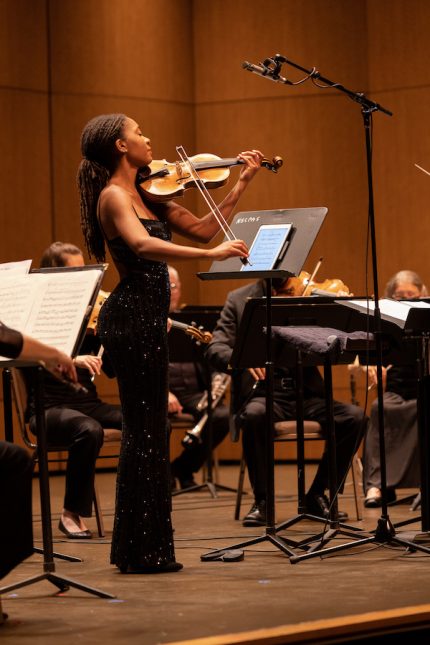A superb violinist sparks the Chicago Philharmonic’s enjoyable return to live music

With its interestingly varied concert on Sunday afternoon at the North Shore Center for the Performing Arts in Skokie, the Chicago Philharmonic became the first local symphony orchestra to launch its 2021-22 season on its home turf, and non-virtually at that. True, both the Chicago Sinfonietta and Music of the Baroque had similarly emerged from the long pandemic lockdown a week or so earlier, but those appearances were strictly one-off teasers for their subscription series and presented at off-site venues.
There were plentiful reminders at this kickoff to the CPO’s 32nd season that the Philharmonic, like just about every other classical group in the area, is far from returning to pre-Covid normalcy. None of the four works on the program enlisted the orchestra at full player strength, masks were de rigueur and social distancing was applied on stage. Audience members were required to present proof of vaccination and ID cards as they entered the hall, and were expected to remain masked throughout the concert. The auditorium was considerably less populated than normal.
But the excitement about the player-run ensemble’s return to making live music again after nearly 18 months of canceled events and deafening silence was palpable. “I would greatly prefer to [be playing to] several hundred listeners here than thousands on Zoom,” said Scott Speck, the orchestra’s artistic director and principal conductor, in his welcoming remarks.
A four-concert season that includes the launch of a promising, three-year composer-in-residence program; world premieres by composer Nicholas Hubbell and inaugural resident composers Jonathan Bingham and Reinaldo Moya, and the American premiere of Jennifer Higdon’s Mandolin Concerto (with soloist Avi Avital) should kick up attendance as the season goes on.
Despite the long hiatus, or perhaps because of it, the various ensemble distillations of the Philharmonic dug into the music cleanly and vigorously under Speck’s attentive command.
The program took its apt title from that of the opening piece, William Grant Still’s “Out of the Silence.” This is a section from the composer’s 1939 piano suite Seven Traceries, heard here in, presumably, Still’s own arrangement for flute, piano and strings. Speck drew from his dozen players a warmly expansive reading that brought out the mystical spirituality of this music.
The bulk of Sunday’s program turned the spotlight on soloists.
The soloistic novelty turned out to be resident composer Marcus Norris’s mini-violin concerto Glory (2019), given its live-concert premiere after having debuted on the orchestra’s virtual concert, “Redemption,” which began streaming on June 29.
The 30-year-old Norris is a Ph.D. candidate at UCLA with strong Chicago connections. A single movement lasting little more than 10 minutes, the piece comes saddled with a street-smart poem and program notes that allude to the effort involved in overcoming adversity before reaching a state of “triumph.” Norris cites Beethoven’s First Piano Concerto as inspiration, although these ears could detect nothing Beethovenian in its unfolding. The harmonically inconclusive ending is odd, suggesting that Norris’ hero has achieved an equivocal “triumph,” at best.
Norris writes idiomatically for the solo fiddle – give him that. And Sunday’s soloist, the young, exceptionally gifted, D.C.-based violin virtuoso Njioma Grevious, did a terrific job with the piece, digging into the rocking, Vivaldi-esque arpeggios that occupy the latter pages. But there was scant musical substance beyond the old-hat solo gestures to make one want to experience the perhaps ironically titled worka second time. That said, Grevious is a superb fiddle talent who should go far with her career; one would not mind hearing her again.
The golden oldie was Mozart’s Clarinet Concerto, winningly played by the Russian-born clarinetist Sergey Gutorov, a “musician member” of the Chicago Philharmonic, who played from score. His exemplary technique and classically poised musicality were on full display, sensitively backed by Speck and an ensemble of about 18 players. Gutorov’s breath control allowed him to spin seamless phrases with tonally mellifluous ease. He “sang” the cantabile of the central Adagio with feeling, and the playful interplay between clarinet and tutti in the Rondo finale made its wonted effect.
The Philharmonic continues to enjoy a busy side-gig as a ballet orchestra, and their terpsichorean bona fides were fully challenged by the concluding piece, Copland’s complete Appalachian Spring (1944), played in its original instrumentation for a chamber ensemble of strings, winds and piano.
Quite apart from providing an apposite floor for one of Martha Graham’s most iconic ballets, this music serves as one of Copland’s most deservedly popular (and quintessentially American-nostalgic) inspirations for the concert hall. It was good to experience the original score, where details emerge in higher relief than in the standard orchestral suite.
Speck led a clear, cohesive, affectionate account in which the dance rhythms were cleanly sprung and a flowing continuity was duly observed. The overly prominent clarinet in the “Simple Gifts” variations was the only balancing blemish.
The Chicago Philharmonic season will continue with serenades by Brahms and Dvorak, and a world premiere by resident composer Jonathan Bingham, Nov. 21 at the North Shore Center for the Performing Arts. Remaining concerts on March 27 and May 29 will take place at the Harris Theater for Music and Dance in downtown Chicago. chicagophilharmonic.org.
Posted in Performances





Posted Sep 16, 2021 at 3:20 pm by Ang Montgomery
It was great! I agree with the reviewer that this was an enjoyable concert and that the young violinist and the clarinetist were a pleasure to hear. However, I heard Norris’ piece differently. There were some sweet moments I enjoyed as well as some exciting, toe-tapping sections that were a welcome addition to the wonderful texture of the Phil’s program that day. Norris’ ending also resonated with me. The final note felt rather like the hero after triumph stating to the antagonist “gotcha — you thought I wouldn’t make it through these tribulations.” I wouldn’t mind hearing more from this new composer in the future. Cheers!